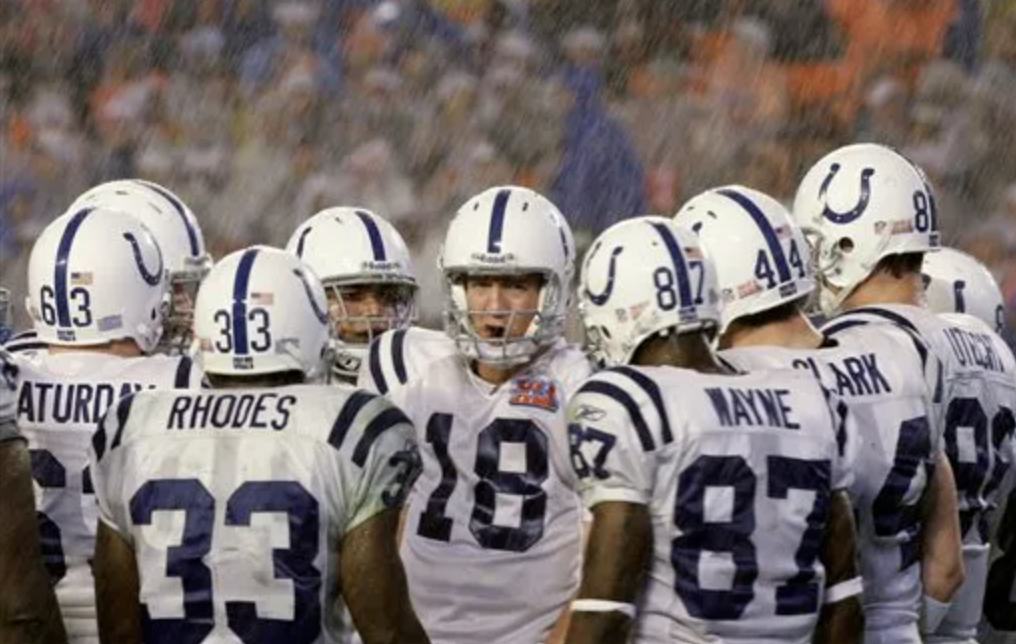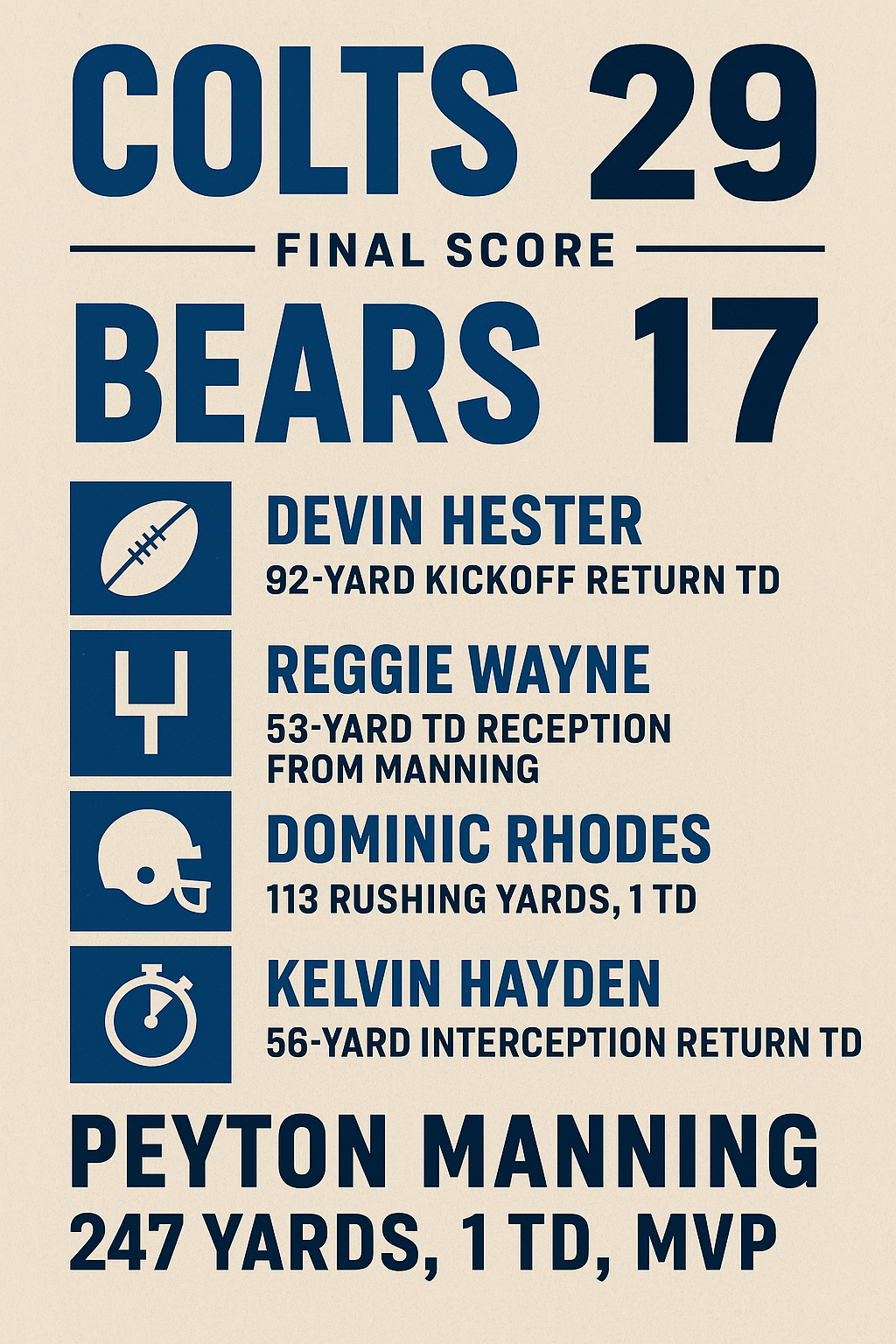Super Bowl XLI: Colts Claim Glory in the Rain

On February 4, 2007, in a rain-soaked Dolphin Stadium in Miami Gardens, Florida, two teams with rich histories and iconic leaders squared off in Super Bowl XLI. The Indianapolis Colts, led by head coach Tony Dungy and quarterback Peyton Manning, faced the Chicago Bears, guided by Lovie Smith and boasting the league’s most fearsome special teams and defense. When the final whistle blew, it was Indianapolis who triumphed, 29–17, earning their first Super Bowl title since the franchise’s Baltimore days in 1971.
Yet this game was about far more than just who held the Lombardi Trophy at the end. It marked a historic coaching milestone, defined legacies, and illustrated how discipline and resilience could overcome weather, nerves, and early adversity.
A Historic Opening: Hester Electrifies the Field
The game began in truly historic fashion. Devin Hester, the Bears’ dynamic return man, took the opening kickoff 92 yards for a touchdown, the first time in Super Bowl history that the game opened with a kick return score.
The Colts were immediately stunned. As the rain poured and the Miami turf slickened, the threat of a momentum avalanche loomed. But Manning and company never panicked. “It was a punch to the mouth,” said Colts linebacker Gary Brackett, “but we knew we weren’t going down.”
According to the Super Bowl Historical Society, “No Super Bowl opening has matched the electricity and statement of Devin Hester’s return. It set a tone, but not the tone the Bears hoped would define the night.”
Weathering the Storm—Literally and Figuratively
Rain was the X-factor all evening. The South Florida downpour turned the field into a slip-and-slide, leading to multiple turnovers and uncharacteristic fumbles from both sides. Ball control and time of possession became paramount. While the Bears often thrived in gritty, weather-driven contests, it was the Colts’ offense that adapted faster and smarter.
After an early interception, Peyton Manning found his groove. He finished the game with 247 yards, 1 touchdown, and 1 interception, but more importantly, he managed the game with a calculated calm. Manning wasn’t flashy, but he was surgical.
He hit Reggie Wayne for a 53-yard touchdown in the first quarter to immediately respond to Hester’s fireworks. The Colts’ offense, known for its high-octane precision, adjusted to shorter passes and ground control to nullify the Bears’ defensive threats.
Running back Dominic Rhodes emerged as the unlikely offensive hero, grinding out 113 yards and a touchdown, while Joseph Addai chipped in with 143 total yards from scrimmage.
Dungy and Smith: A Groundbreaking Coaching Matchup
This game was monumental off the field as well. Tony Dungy and Lovie Smith became the first two Black head coaches to lead teams to the Super Bowl, a moment of immense significance in NFL history.
Dungy’s quiet strength and steadfast belief in team-first football stood in contrast to the sport’s often fiery personas. He became the first Black head coach to win a Super Bowl, a milestone that transcended sport.
“Tony Dungy’s victory wasn’t just a personal triumph—it was a symbolic one,” noted the Super Bowl Historical Society. “It represented a breaking of barriers, the power of perseverance, and the right to lead through dignity and intellect.”
Dungy’s coaching tree would go on to influence generations of NFL sideline leaders, and his relationship with Smith—who once served under Dungy in Tampa Bay—added another layer of meaning to this championship.
Defensive Discipline and Strategic Adjustments
The Colts’ defense had been their Achilles’ heel all season. Ranked near the bottom in rushing defense during the regular season, many questioned whether they could contain Thomas Jones and the Bears’ ground attack.
But in the playoffs, and especially in the Super Bowl, Bob Sanders, Dwight Freeney, Robert Mathis, and company flipped the script. Sanders, in particular, was a missile from the secondary, neutralizing the run game with decisive hits and forcing the Bears into long-yardage situations.
The Bears’ offense, meanwhile, faltered under the spotlight. Rex Grossman, who had been up-and-down all season, struggled mightily. He threw two costly interceptions, including a pick-six by Kelvin Hayden in the fourth quarter that effectively sealed the game.
Grossman’s final line—20-of-28 for 165 yards, 1 TD, and 2 INTs—masked the lack of confidence that seemed to permeate the Bears' offense after the first quarter.
The Turning Point: Control Through the Trenches
Despite the early drama, the Colts gradually squeezed the life out of the Bears with consistent, grinding drives. In the second half, Indianapolis owned the clock, keeping the Bears’ defense on the field and wearing them down snap by snap.
The offensive line of the Colts, anchored by Jeff Saturday, won the battle up front. They allowed Manning the time he needed and opened up holes for Rhodes and Addai. By the fourth quarter, the Bears' vaunted defense was visibly fatigued.
The Colts’ lead slowly expanded, and the Bears couldn’t find rhythm. Their inability to respond to Indianapolis’ physical control spelled doom.
The MVP: Peyton Manning’s Vindication
Though Rhodes and Addai made strong cases, Peyton Manning was named Super Bowl MVP. It was a crowning moment for a quarterback who had long been labeled as someone who “couldn’t win the big one.” Critics had often compared him unfavorably to contemporaries like Tom Brady, pointing to a lack of playoff success.
That narrative ended on the soaked turf of Dolphin Stadium.
Manning didn’t post gaudy numbers, but he controlled the tempo, executed with maturity, and outmaneuvered a defense that thrived on chaos. He made the right reads, the right check-downs, and delivered the game that had eluded him for nearly a decade.
“It wasn’t Peyton’s flashiest game,” the Super Bowl Historical Society noted, “but it was his most important. He silenced the doubters with poise, control, and the ability to adjust when it mattered most.”
Legacy Defined and the End of an Era
The win marked the culmination of years of near-misses for the Colts. Their playoff heartbreaks—especially those at the hands of the Patriots—had been brutal. But the victory in Super Bowl XLI wasn’t just redemption. It was validation for a franchise that believed in building through the draft, patience, and system continuity.
For the Bears, it marked the end of a dominant run by a defense that will be remembered as one of the league’s fiercest units in the mid-2000s. But without a quarterback to match its ferocity, the team was ultimately undone by offensive limitations.
Final Score: Colts 29, Bears 17
- Devin Hester: 92-yard kickoff return TD
- Reggie Wayne: 53-yard TD reception from Manning
- Dominic Rhodes: 113 rushing yards, 1 TD
- Kelvin Hayden: 56-yard interception return TD
- Peyton Manning: 247 yards, 1 TD, MVP

Conclusion: A Win for Legacy, for Leadership, for Progress
Super Bowl XLI will always be remembered for breaking barriers. It delivered football drama, historic firsts, and the long-awaited coronation of one of the game’s greatest quarterbacks. It was a game where teamwork triumphed over flash, where patience overcame panic, and where history was made both on and off the field.
In the words of Colts safety Antoine Bethea, “It wasn’t about proving people wrong—it was about proving ourselves right.”
And that they did, in the rain, under the lights, forever etched into the fabric of football history.
